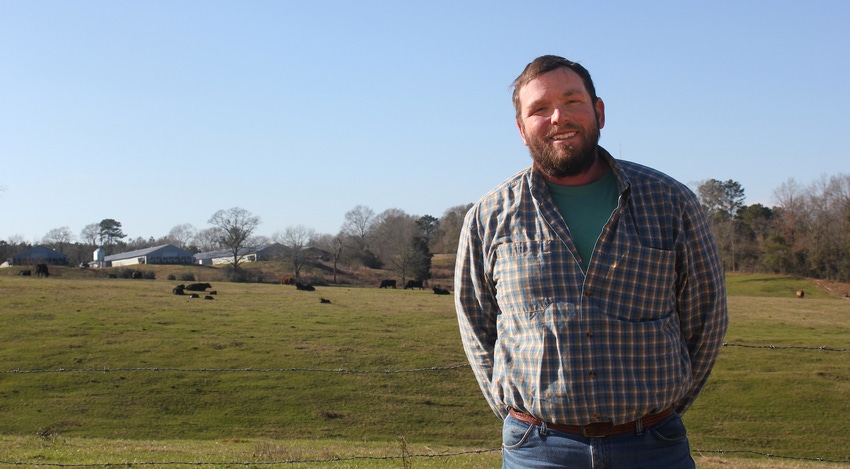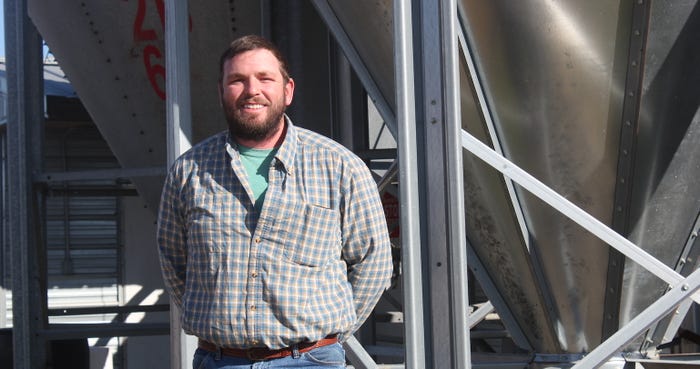
Sean McDonald went to college with the intention of becoming a physical therapist.
Of course, life rarely goes according to plan, and McDonald’s story is no different. Instead of starting a physical therapy practice, he bought a farm at the age of 21. Today, at just 30 years old, McDonald and his wife, Morgan, own eight broiler houses, run a cow-calf operation, and manage a custom hay baling business, as well as a custom fertilizer business near Laurel, Miss. He also serves as chairman of the Mississippi Poultry Association’s Grower Advisory Committee.
“I’ve always been someone who’s ready to jump in with both feet and get to work,” McDonald said. “A lot of people don’t understand it, and you don’t see as many young people on the farm today, but I wouldn’t trade it for anything.”
McDonald is about as far from the screen-obsessed-Millennial stereotype as you can get. As he gave us a tour of his farm, it is apparent that the hands-on job of tending and caring for growing animals is truly a passion.
“There’s something satisfying about seeing life grow before your eyes and knowing you played a part in it,” McDonald said. “The reward of farming is not monetary. It’s other things you get to see and do.”

Running a broiler operation
While the McDonald operation is diverse, the largest portion of the farm income is derived from poultry. The McDonalds grow for Wayne Farms. On the day of our visit, they had just received about 160,000 day-old chicks (roughly 20,000 per house). They’ll raise each flock for approximately eight weeks getting the birds to the right market weight — around 6-8 pounds.
During that time, the growing birds are kept under a watchful eye. McDonald walks the houses every day. He also uses a Rotem Platinum Plus Environmental Controller, which allows him to closely monitor all aspects of the poultry house, including feed, water, temperature and ventilation.
After birds are transported to the plant for processing, McDonald says it is time to clean out the houses and prepare for the next flock.
“Between flocks it’s all hands on deck. We can clean out all of our houses and be ready for a new flock in about 10 days,” McDonald said.
That is an impressive feat when you consider that one chicken house can produce around 25 tons of litter per flock. McDonald says nothing goes to waste, with the leftover litter contributing to his growing fertilizer business.
“Poultry litter is a hot commodity. It’s a good organic fertilizer. Chickens have a diverse digestive system, so it’s got all the essential fertilizers packed into one. I use a lot of it on my land.”
It is a labor-intensive career, but McDonald says the hardest part of the job is seeing misconceptions of poultry production spread through the media.
“We receive a lot of flack from various activist groups. None of that is true. Our birds are very well cared for, they have plenty of room and proper ventilation.” He adds, “It’s good practices and good genetics that produce quality meat. We’re not using hormones. In fact, I think chickens are the cleanest meat you can get.”
Passing on the tradition
As an elementary teacher, Morgan McDonald has a unique platform to share the story of agriculture with her students. Sean, too, has worked with Mississippi State students interested in careers in the poultry industry. However, he says the most important audience is his own two children.
“Probably the most rewarding part of farming is getting to raise your kids on the farm. There may be no better place to instill the value of hard work. In my opinion, there’s no other way to raise a kid but on a farm.”
While Sean may not have originally intended to go into poultry farming, it is in his blood. His grandparents had chicken houses. His wife grew up on the chicken farm they now own and operate. He is hopeful to pass on the tradition to the next generation.
McDonald will be the first to tell you, life doesn’t always go as planned. Sometimes it turns out better.
About the Author(s)
You May Also Like






